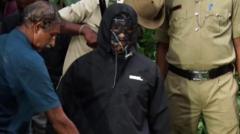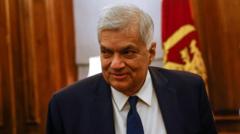German authorities have confirmed the arrest of a Ukrainian national linked to the attacks on the Nord Stream pipelines, raising questions of international involvement and potential ramifications.
Ukrainian Man Arrested in Connection with Nord Stream Pipeline Sabotage

Ukrainian Man Arrested in Connection with Nord Stream Pipeline Sabotage
A Ukrainian suspect has been detained by Italian police for allegedly coordinating the 2022 Nord Stream pipeline attacks, marking the first significant arrest connected to the sabotage.
In an impactful step in the ongoing investigation into the Nord Stream pipelines sabotage, Italian police have arrested a Ukrainian citizen believed to be the mastermind behind the undersea explosions that occurred in 2022. This event has drawn heightened scrutiny given its geopolitical significance, especially in the context of the ongoing conflict between Russia and Ukraine.
German prosecutors disclosed that the suspect, identified only as Serhii K. due to privacy laws, was apprehended in Misano Adriatico, Italy. Officials stated this is the first arrest related to a sabotage act that had previously baffled investigators, who initially struggled to establish culpability.
Justice Minister Stefanie Hubig praised the federal prosecutor's achievements, emphasizing that the arrest marked a significant breakthrough in the investigation. Investigators believe that Serhii K. was pivotal in coordinating the bombing of two critical gas pipelines—Nord Stream 1 and Nord Stream 2—utilizing a complex operation involving divers and a chartered sailboat that was rented using a shell company and fraudulent documents.
The explosions occurred on September 26, 2022, leading to substantial gas leaks in the Baltic Sea, although the pipelines were not functioning at the time. This incident occurred against a backdrop of heightened tensions following the Russian invasion of Ukraine, with Russia previously halting gas exports through Nord Stream 1 in an attempt to apply pressure to Europe.
Following these events, speculation about the masterminds behind the sabotage has circulated widely, blaming various parties, including Russia and even the United States, before investigators concluded that a group with Ukrainian ties executed the operation. The Ukrainian government has consistently denied any involvement or coordination of the attacks.
This arrest follows a previous arrest warrant issued by German authorities targeting another Ukrainian individual connected to the same case, who managed to evade capture in Poland over a year ago. As the extradition process is expected to unfold slowly, the broader implications of this incident and the subsequent legal proceedings remain to be seen in the context of international relations and ongoing tensions related to energy security in Europe.



















